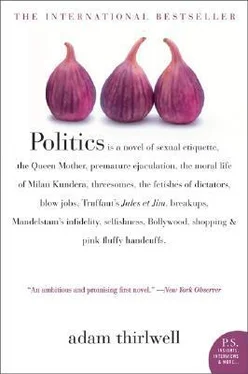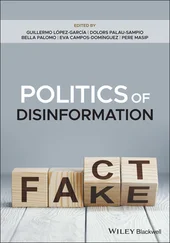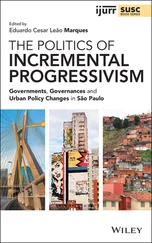Adam Thirlwell - Politics
Здесь есть возможность читать онлайн «Adam Thirlwell - Politics» весь текст электронной книги совершенно бесплатно (целиком полную версию без сокращений). В некоторых случаях можно слушать аудио, скачать через торрент в формате fb2 и присутствует краткое содержание. Год выпуска: 2004, Издательство: Harper Perennial, Жанр: Современная проза, на английском языке. Описание произведения, (предисловие) а так же отзывы посетителей доступны на портале библиотеки ЛибКат.
- Название:Politics
- Автор:
- Издательство:Harper Perennial
- Жанр:
- Год:2004
- ISBN:нет данных
- Рейтинг книги:3 / 5. Голосов: 1
-
Избранное:Добавить в избранное
- Отзывы:
-
Ваша оценка:
- 60
- 1
- 2
- 3
- 4
- 5
Politics: краткое содержание, описание и аннотация
Предлагаем к чтению аннотацию, описание, краткое содержание или предисловие (зависит от того, что написал сам автор книги «Politics»). Если вы не нашли необходимую информацию о книге — напишите в комментариях, мы постараемся отыскать её.
Moshe loves Nana. But love can be difficult — especially if you want to be kind. And Moshe and Nana want to be kind to someone else.
They want to be kind to their best friend, Anjali.
Politics
Politics — читать онлайн бесплатно полную книгу (весь текст) целиком
Ниже представлен текст книги, разбитый по страницам. Система сохранения места последней прочитанной страницы, позволяет с удобством читать онлайн бесплатно книгу «Politics», без необходимости каждый раз заново искать на чём Вы остановились. Поставьте закладку, и сможете в любой момент перейти на страницу, на которой закончили чтение.
Интервал:
Закладка:
Moshe looked at her. It was not the break-up he was expecting. Well, obviously he was not expecting any breakup really. But if he were asked what a break-up was, it did not involve a visit to the dentist.
He said, ‘The dentist?’ She said, ‘Well if you don wantto, you could just walk me to the tube. It’s just. I don wan Anjali to hear. I don think that’d be fair.’
It was not a bad idea, Moshe could see that. It was reasonable.
There was an interlude of comical slow-motion real-time dressing. Then Nana and Moshe left. Without an umbrella, they went out into the rain.
5
In 1920, when the Civil War was taking place in Communist Russia, Nikolai Bukharin wrote a small book called Economics of the Transition Period. Nikolai was a Bolshevik. So he was quite in favour of the recent revolution. In his book, he tried to explain why everything was going smoothly. He tried to explain that, while it might look like the country was falling apart, in fact everything was fine. The revolution was fine. Some people might be dying, the proletariat might be dying, but that was all part of the plan.
‘From a broader point of view’, wrote Nikolai, ‘- that is, from the point of view of an historical scale of greater scope — proletarian compulsion in all its forms, from executions to compulsory labour, constitutes, paradoxical as it may sound, a method of formation of a new Communist humanity from the human material of the capitalist epoch.’
In the margin, in his copy of this book, Lenin wrote ‘exactly!’
But I am not so sure how exact Nikolai is really being. I think that it is possible to be more precise.
Nikolai was saying that, yes yes, lots of people were being shot or forced to work twenty-hour days. But this was not a bad thing. This was communism. If only people took the long view, thought Nikolai, if only they stopped being selfish, then they might see how wonderful life was.
I am not sure Nikolai picked the right title for his book. Economics of the Transition Period was not quite right. It should have been called Psychology of the Transition Period. The psychology of the transition period is this. It is blind optimism. You tell yourself that things are changing for the better when really they are just fucked.
Here are some figures for the heroic period of the Great Russian Revolution.
In 1917, Petrograd had 2.5 million people. In 1920, it had 700,000. In 1913 there were 2.6 million factory workers. In 1920 there were 1.6 million. In 1920, food consumption was at 40 per cent of pre-war levels. Between January 1918 and July 1920, 7 million people died of malnutrition and epidemics. The death rate doubled. Between 1921 and 1928, in the Ukraine, 200,000 Jews were killed, 300,000 orphaned, and over 700,000 made homeless.
Now, obviously Moshe was not a homeless and butchered Ukrainian Jew. I’m not drawing that parallel. No, I am drawing another parallel.
Moshe was thinking like Nikolai Bukharin. In the middle of a revolution, outside the Americana Cosmetics Store on the Pentonville Road, Moshe was being blindly optimistic.
6
‘I really don think I understand this,’ said Moshe. ‘I love you.’ He had said it once already, it was true, but Moshe did not think that saying it twice was a problem. It was his central point. It was his central incontestable point. So Moshe paused. He paused for effect. While he paused, Moshe faintly chewed on his lower lip.
Nana said, ‘I love you too.’ ‘So why do we need to break up?’ said Moshe.
Moshe faintly chewed on his lower lip.
Then Nana’s phone rang. Moshe looked at it. Nana looked at it. She answered. She said, ‘Hi no I’m. No tomorro. It’s for. Yeah defnitly. Okay cool see you later.’
Moshe looked at the Americana Cosmetics Store’s window display. It was the display of a manic pharmacy. And, even at this moment of crisis, Moshe got distracted by the Store’s offer of
A1 Unisex Hairdressing Afro
European
Moshe examined the wigs slumped on polystyrene busts. There was Sindy and Edna, and Simone and Rosa. None of them was pretty. Amputated ponytails were organised in coloured sections. There was a plastic packet of Natural Eyelashes, dyed with rainbow stripes. Yes, even at moments of crisis, Moshe had his homely side. He could always be amazed by the things people paid for.
Moshe said, ‘But you can’t. I mean. If you mean this. You can’t love me any more.’ And Nana said, ‘No issnot that — I do love you I’ll always love you.’ ‘But you can’t,’ said Moshe.
I feel very sorry for Nana. I feel very sorry for all nice people. It was too difficult for Nana, explaining why she wanted to leave. It was too difficult explaining all the sad unhappy thoughts.
And then the rain stopped.
This made Moshe even sadder. He had been quite liking the effect. Moshe quite liked the film noir connotations of melancholy. Rain, thought Moshe, was at least the right weather for sadness.
7
OK. Let me return to Nikolai Bukharin. I am going to fast forward, from i920 to i930.
By the 1930s, Stalin was a little concerned about Nikolai. A lot of people seemed to think that Nikolai did not adore Stalin as much as he should. They claimed that Nikolai was a terrorist, a conspirator.
Obviously, this upset Nikolai. So Nikolai phoned Stalin up.
‘Hey Nikolai, Kolya, don’t panic,’ said Stalin. ‘We’ll sort things out. Of course we don’t believe you’re an enemy.’ And Nikolai squeaked, ‘But how can you even think that I am an accomplice of terrorist groups?’ Stalin thought this was really adorable. Unravelling a paperclip, he said, ‘Take it easy, Kolya, take it easy. We’ll sort it out.’
I have to say, I do like Stalin’s phone manner. I’ve said it before and I’ll say it again. The man was a telephone genius.
In 1938, Stalin put Nikolai Bukharin on trial for treason.
This is the point where there is another similarity between the life of the politician Nikolai Bukharin and the life of two of my heroes — Nana and Moshe.
At his 1938 show trial, Nikolai made a false confession. He pleaded guilty to ‘the sum total of crimes committed by this counter-revolutionary organisation, irrespective of whether or not I knew of, whether or not I took a direct part in, any particular act’.
Nikolai claimed, of course, that it was not a false confession. That is the essence of any true false confession.
Previously, Nikolai was like Moshe. Now, he is like Nana.
I think that breaking up with someone is rather like participating in a show trial. There is a general pretence of justice and reason. And the person doing the breaking up accepts all responsibility. He or she makes a false confession.
8
Outside the Americana Cosmetics Store, Nana made a false confession.
‘Maybe. Well maybe I just don love you any more.
Maybe you’re right. You’d be better off with Anjali,’ she said. ‘Me I want to be with Papa and it’s simpler. Maybe you’re right.’
I feel sorry for Nana. I do. It was not nice lying like this. But I feel much more sorry for Moshe. It might have been socially tricky and quietly sad for Nana, breaking up with Moshe, but at least it was her decision. It was her anguished and irrational decision. Whereas it was not Moshe’s decision at all. Moshe was not happy. He was lonely. He was suddenly very lonely. Moshe was desperate.
All he could think of was Anjali. This thought did not make him feel less lonely.
He said, ‘Wha do you mean about Anjali?’ Nana said, ‘Well what I said.’ She said, ‘I mean what I said. You’d be better off with Anjali.’ He said, ‘But I don want Anjali. I want you.’
Читать дальшеИнтервал:
Закладка:
Похожие книги на «Politics»
Представляем Вашему вниманию похожие книги на «Politics» списком для выбора. Мы отобрали схожую по названию и смыслу литературу в надежде предоставить читателям больше вариантов отыскать новые, интересные, ещё непрочитанные произведения.
Обсуждение, отзывы о книге «Politics» и просто собственные мнения читателей. Оставьте ваши комментарии, напишите, что Вы думаете о произведении, его смысле или главных героях. Укажите что конкретно понравилось, а что нет, и почему Вы так считаете.












